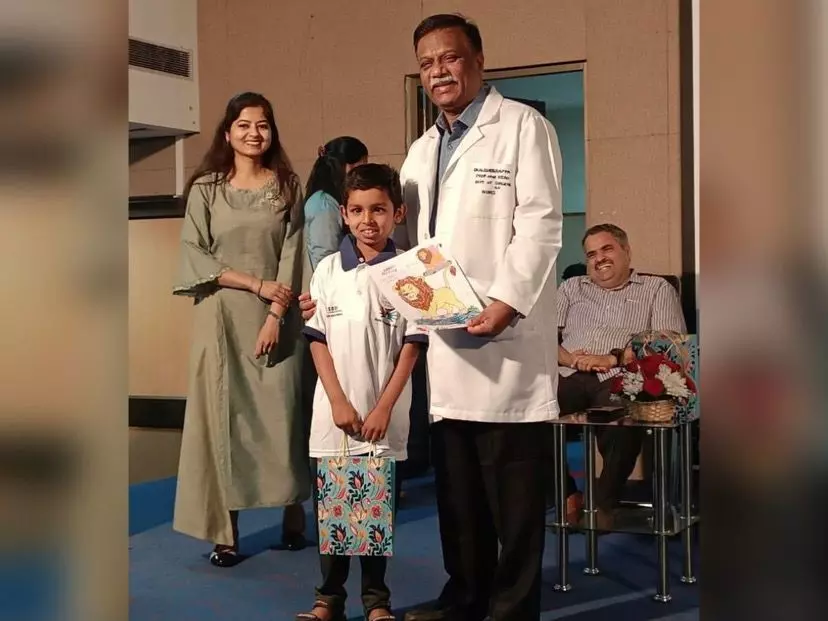World Rare Disease Day: Hyderabad group lobbies for better care, services for patients
The purpose of the event was to raise awareness about rare diseases, particularly Lysosomal Storage Disorders.
By Newsmeter Network
From the World Health Disease Day Event
Hyderabad: The Lysosomal Storage Disorders Support Society (LSDSS), in collaboration with the Centre for DNA Fingerprinting and Diagnostics (CDFD) and Nizam’s Institute of Medical Sciences (NIMS), hosted an event to commemorate World Rare Disease Day at NIMS, Hyderabad on 11 March. The purpose of the event was to raise awareness about rare diseases, particularly Lysosomal Storage Disorders (LSDs), and to lobby for better treatment, care, and government assistance for patients.
Rare Disease Day
Rare Disease Day is an internationally coordinated effort for people living with rare diseases to achieve fairness in social opportunities, healthcare, and access to diagnosis and therapies. Sanofi, a global healthcare company, has been a supporter of the rare disease day event commemoration in India for the past 13 years since the first event was held in 2010 at the Sir Gangaram Hospital in Delhi.
Lysosomal storage diseases
Lysosomal storage diseases are uncommon genetic abnormalities that affect one in every 7,000 people worldwide. There is currently no cure for LSDs, and therapy is expensive, ranging from Rs. 50 lakhs to Rs. 2 crores per patient. As a result, most patients cannot afford the procedure. The gathering emphasised the critical need for expanded awareness, improved diagnosis, and more affordable treatment choices for LSD patients in India.
“We are thrilled to have cooperated with CDFD and NIMS, Hyderabad to conduct this event. We intended to raise awareness about rare diseases and lobby for more care and services for sufferers and their families through this event. Now that the ministry of health and family welfare has provided funds for around 130 qualified patients, we ask the government to continue its support for this cause by establishing an annual budgetary allocation, particularly for rare disease patients. This might go a long way towards guaranteeing funding sustainability, especially for individuals with chronic uncommon illnesses like LSDs,” said Manjit Singh, president of LSDSS.
The event, which had the theme “Uniting for a Better Future: Empowering Those with Rare Disorders,” was attended by several senior doctors as well as rare disease patients and their families from across the state.
Dr. Nagari Beerappa, director of NIMS, inaugurated the event by lighting a lamp. He said, “It’s an emotional time for me today as I see children all around painting and actively engaging in the event. We used to get letters from Lysosomal Storage Disorder sufferers asking for aid, but we didn’t know if there was a solution because of the exorbitant treatment costs. We have now filed a letter to the Central government requesting that funds be released for rare disease patients in our state, and the state government is also willing to assist these people financially. These patients require our assistance, and we ask that the government continue to assist us so that these children’s lives can be preserved.”
‘Need screening for newborns’
Dr. Radha Rama Devi, consultant, Sandor Life Sciences, Hyderabad, and Rainbow Children Hospital, Hyderabad, said, “Through the various programmes made available by the government, we need to have a newborn screening in our state for treatable genetic disorders so that treatment can be made available early to avoid organ damage. We have children undergoing therapy at our facility who are living fulfilling lives, demonstrating the transformative power of early discovery and timely intervention.”
‘Rare diseases can be treated with early diagnosis'
Dr. Ashwin Dalal, head of the diagnostics division at the Centre for DNA Fingerprinting and Diagnostics, said, “Rare diseases are chronic in nature but can be treated with early diagnosis and proper management. The government has taken encouraging efforts, beginning with the completion of the National Policy for Rare Diseases in 2021, followed by an increase in financing to Rs. 50 lakhs per patient in 2022, and lastly transfer of funds and enrolment of eligible patients in 2023. The establishment of a Centre of Excellence for Rare Diseases in Hyderabad is just another sign that things are moving in the right path.”
He said that the most pressing need right now is continued support for Group 3 illnesses such as Lysosomal Storage Disorders. “While the government is offering financial support, corporate contributions through CSR will help save more lives. Indigenous production of drugs will also help reduce the exorbitant price of the therapy,” he added.